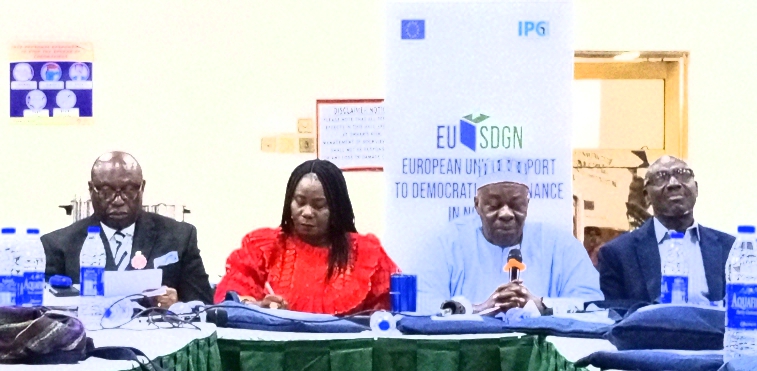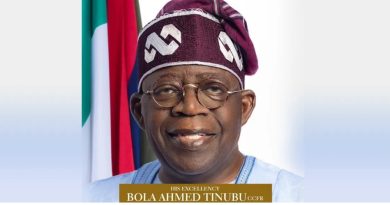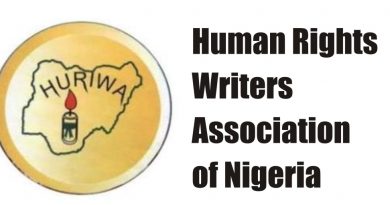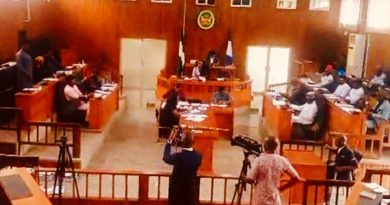No going back on BVAs says Okoye, as INEC, Media, CSO parley on Electoral Misinformation/ Disinformation
Oru Leonard
Less than 90 days to the general elections in Nigeria the Independent National Electoral Commission (INEC), has disclosed that the use of Bimodal Voter Accreditation System, BVAS, for the 2023 general elections, was irreversible.
This was disclosed at a Media/Civil Society Organizations, CSO, Interface on Identifying and Mitigating Flashpoints of Electoral Misinformation and Disinformation organised by the International Press Centre, IPC, with support from the lead partner of component 4 (Support to media) of the European Union Support to Democratic Governance in Nigeria-Phase II (EUSDGN II) project yesterday, at Abuja, FCT Nigeria.
Speaking, the National Commissioner and Chairman, Information and Voter Education Committee of INEC, Mr. Festus Okoye, also said that the 2023 general election will be based on the Electoral Act 2022 which introduced new and creative innovation on the electoral ecosystem.
“In furtherance of efforts to ensure free, fair, and credible elections, the Commission continues to explore the use of technology in our elections. One of such innovation in preparation for the 2023 general election is the replacement of the SCR with the Bimodal Voter Accreditation System (BVAS) to improve and strengthen the voter verification, authentication and accreditation process. The use of the BVAS for voter accreditation and authentication is irreversible and backed by law.”he stated.
On the issue of Permanent Voters’ Cards, PVCs, Okoye said, “The collection of the PVC is an ongoing exercise. There remain uncollected PVCs from previous registrations. The Commission has developed Guidelines for PVC collection especially for those that registered between January 2022 and July 2022. The collection of the PVCs will start on the 12th day of December 2022 and end on the 22nd day of January 2023. The Commission’s policy of “No PVC, No Voting” will continue to subsist and registered voters should endeavour to collect their PVCs to vote in the 2023 general election and other elections.”
In recognition of the important role that stakeholders play in the electoral and political processes, the Commission in preparation for the 2023 general election, said it was engaging with political parties, civil society organizations, the media and security agencies through the Inter-Agency Consultative Committee on Election Security (ICEES).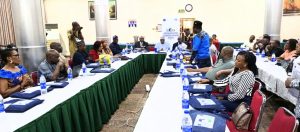
“Apart from the regular quarterly meetings, special meetings are convened to brief stakeholders and to discuss the important electoral issue of voter access to polling units, introduction of new electoral technologies and election security. These engagements have proved very useful in building trust and confidence in the electoral process. The Commission will also continue to engage with all stakeholders, including relevant Ministries, Departments and Agencies of government to seek areas of collaboration in improving the electoral process.”
He called on the critical stakeholders to rise and fight the spectre of misinformation and disinformation and resist deliberate falsehood aimed at delegitimizing the Commission and the electoral process, while assuring that INEC would remain true to its commitment to openness and transparency
INEC reiterated that, “No PVC No Voting”.
Earlier in his welcome address, the Executive Director of International Press Center, Mr. Lanre Arogundade said the interface was holding within the context of the need to make appropriate strategic response to the twin-menace of misinformation and disinformation so that the worst of information disorder do not envelope the electoral landscape.
He expressed optimism that the matters arising from this interactive session wiould contribute to the design of appropriate fact-checking tools and messages through short videos, hackathons and other ICE materials on combatting fake news in the electoral process.
“The fact-checking of claims by politicians under the on-going monitoring of media coverage of 2023 elections, the establishment of a fact-checking unit in IPC’s news portal and media resource – the Nigeria Democratic Report – (www.ndr.org.ng), the empowerment of citizens with the knowledge to detect fake news, etc, are the other activities by IPC geared towards sanitising the electoral information space.”
The interface which was chaired by Prof. Jibrin Ibrahim, Chairman of the Editorial Board of Premium Times and Senior Fellow of Centre for Democracy and Development (CDD), brought experts from INEC, the media and the civil society together on Saturday December 10, 2022 and brainstormed on the challenge of disinformation and misinformation as the 2023 general elections beckons.
Expert interventions on findings in the field were made by the Senior Programs Manager, Centre for Democracy and Development (CDD), and the Editor, Dubawa, Mr Kemi Busari.

